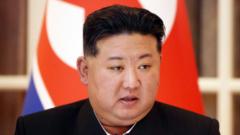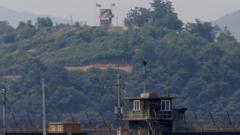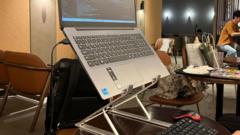The North's recent missile test highlights escalating tensions between North and South Korea amidst ongoing military exercises in the region
North Korea Conducts Missile Test Under Kim Jong Un's Oversight

North Korea Conducts Missile Test Under Kim Jong Un's Oversight
State media claims missiles exhibit advanced technology and combat capability
North Korean state media reported that two new air defense missiles were launched in a recent test supervised by leader Kim Jong Un. The Korean Central News Agency (KCNA) described the missiles as possessing "superior combat capability" through the application of "unique technology," although specific details were not disclosed. Conducted on Saturday, the test demonstrated the missile’s proficiency in targeting a wide array of aerial threats, including drones and cruise missiles, according to KCNA.
This test coincides with a tense moment on the Korean Peninsula, as South Korea confirmed it had fired warning shots at North Korean soldiers who briefly crossed the Demilitarized Zone (DMZ). Sources report that approximately 30 North Korean troops ventured into the heavily fortified border area, resulting in Pyongyang accusing Seoul of engaging in "deliberate provocation." The situation has intensified, with South Korea and the United States conducting extensive joint military drills since the previous Monday.
Adding to the geopolitical landscape, South Korean President Lee Jae Myung is scheduled to meet with US President Donald Trump for a summit in Washington on Monday. President Lee had previously campaigned for improved relations with North Korea; however, efforts towards reconciliation have faced strong resistance, notably from Kim's sister who has dismissed these propositions.
Earlier this month, Kim Jong Un lambasted the US-South Korea joint military maneuvers, denouncing them as provocative. He also pledged to expedite North Korea’s nuclear weapons program. In January, North Korea touted the test of an intermediate-range ballistic missile equipped with a hypersonic warhead, claiming it was a reliable deterrent against adversaries in the Pacific.
Concerns have been raised regarding potential Russian missile technology aiding North Korea's ballistic advancements, with allegations of Moscow supplying equipment to bolster Pyongyang’s defenses amid the ongoing conflict in Ukraine. Despite these developments, it remains uncertain whether the latest missile tests employed any such foreign technology.
North Korea, ruled by the Kim dynasty for decades, is one of the most authoritarian states in the world. The division between North and South Korea, dating back to the Korean War's conclusion in 1953, persists without a formal peace treaty, placing both nations in a continued state of technical war despite a lack of active conflict in recent years.
This test coincides with a tense moment on the Korean Peninsula, as South Korea confirmed it had fired warning shots at North Korean soldiers who briefly crossed the Demilitarized Zone (DMZ). Sources report that approximately 30 North Korean troops ventured into the heavily fortified border area, resulting in Pyongyang accusing Seoul of engaging in "deliberate provocation." The situation has intensified, with South Korea and the United States conducting extensive joint military drills since the previous Monday.
Adding to the geopolitical landscape, South Korean President Lee Jae Myung is scheduled to meet with US President Donald Trump for a summit in Washington on Monday. President Lee had previously campaigned for improved relations with North Korea; however, efforts towards reconciliation have faced strong resistance, notably from Kim's sister who has dismissed these propositions.
Earlier this month, Kim Jong Un lambasted the US-South Korea joint military maneuvers, denouncing them as provocative. He also pledged to expedite North Korea’s nuclear weapons program. In January, North Korea touted the test of an intermediate-range ballistic missile equipped with a hypersonic warhead, claiming it was a reliable deterrent against adversaries in the Pacific.
Concerns have been raised regarding potential Russian missile technology aiding North Korea's ballistic advancements, with allegations of Moscow supplying equipment to bolster Pyongyang’s defenses amid the ongoing conflict in Ukraine. Despite these developments, it remains uncertain whether the latest missile tests employed any such foreign technology.
North Korea, ruled by the Kim dynasty for decades, is one of the most authoritarian states in the world. The division between North and South Korea, dating back to the Korean War's conclusion in 1953, persists without a formal peace treaty, placing both nations in a continued state of technical war despite a lack of active conflict in recent years.















